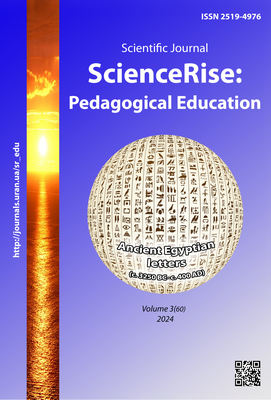Folk games as a tool of formation of artistic and creative competence of primary school children in music classes
DOI:
https://doi.org/10.15587/2519-4984.2024.311589Keywords:
folk game, competence, art, game, independence, role, host, plot, dance, ritual game, dramatizationAbstract
The article describes the features of acquiring artistic and creative competence, as a child's elementary awareness of the specifics of art forms (artistic and productive, musical, theatrical); valuable attitude to art and artistic activity, the desire to perceive folklore art. Folkloric forms of the heritage of Ukrainian culture are considered. Teaching and methodical material and practical recommendations are offered, which in music classes will be useful both to experienced teachers of preschool institutions and to those workers who are starting to work with the smallest brains.
Normative documents in the field of preschool education were studied and play competence was considered as a child's ability to free, emotionally saturated, spontaneous activity on his/her own initiative, in which the possibility of applying existing and assimilating new knowledge and personal development is realized due to the child's desire to participate in the life of adults through the realization of interests in game and role-playing actions in a generalized form.
The necessity of using folk games for the formation of artistic and creative competence in preschool children is substantiated. Peculiarities of knowledge of the surrounding world of preschool children and themselves in it are determined.
The work proposes to create a basis for the natural formation and development of musical abilities in preschoolers through a folk game by encouraging children to play folk games. It has been emphasized that raising children is based on love and respect for Ukrainian musical folklore.
The secrets of conducting music classes using folk games and working with preschoolers are recommended to teachers of primary schools, music teachers, teachers of children's vocal ensembles of extracurricular and club institutions, scientists, graduate students, students of pedagogical and art educational institutions, parents and the general public
References
- Prystupa, Ye., Slymakivskyi, O., Lukianchenko, O. (1999) Ukrainski narodni rukhlyvi ihry, rozvahy ta zabavy: metodolohiia, teoriia i praktyka. Drohobych: Vydannia TzOV «Vymir», 449.
- Filatova, L. (2002). Pidhotovka maibutnikh uchyteliv pochatkovykh klasiv do orhanizatsii spilkuvannia uchniv u protsesi rozvyvaiuchykh ihor. [Extended abstract of PhD thesis; Kharkiv. nats. ped. un-t im. H. S. Skovorody].
- Abrantes, S. L., Gouveia, L. (2012). Using Games for Primary School. Handbook of Research on Serious Games as Educational, Business and Research Tools. IGI Global, 769–781. https://doi.org/10.4018/978-1-4666-0149-9.ch039
- Proskura, O., Rusova, S. (2014) Kontseptsiia ukrainskoho dytiachoho sadka. Doshkilne vykhovannia, 7, 16–18.
- Barna, Kh. V., Chekan, О. І. (2018). Use of traditions of native land in breeding civil qualities of children of senior pre-school age. Scientific Bulletin of Mukachevo State University Series “Pedagogy and Psychology,” 1 (7), 133–136. https://doi.org/10.31339/2413-3329-2018-1(7)-133-136
- Tovkailo, K. (2021) Estetychne vykhovannia doshkilnykiv u protsesi muzychno-rytmichnoi diialnosti. Doshkilna osvita v Ukraini ta zarubizhzhi: tradytsii, dosvid, innovatsii. Kharkiv, 73–75.
- Sadovenko, S. (2007). Metodyka formuvannia muzychnykh zdibnostei u ditei doshkilnoho viku (na materiali ukrainskoho folkloru). [Extended abstract of PhD thesis; Ukrainskyi derzhavnyi universytet imeni Mykhaila Drahomanova].
- Hubalovska, M., Kubankova, A., Milova, T. (2022). Folk Crafts In Work Activities At Primary School. 15th annual International Conference of Education, Research and Innovation. IATED. https://doi.org/10.21125/iceri.2022.0977
- Ospankulov, Y., Zhumabayeva, A., Nurgaliyeva, S. (2023). The impact of folk games on primary school students. Journal of Education and E-Learning Research, 10 (2), 125–131. https://doi.org/10.20448/jeelr.v10i2.4473
- Maslianytsia. Pisochynska pochatkova shkola «Nadiia». Available at: http://pisochyn-nadiya.kh.sch.in.ua/zhittya_shkoli/svyata_ta_pamyatni_dati/maslyanicya/
- Sutton-Smith, B. (1989). Children’s Folk Games as Customs. Western Folklore, 48 (1), 33. https://doi.org/10.2307/1499979
Downloads
Published
How to Cite
Issue
Section
License
Copyright (c) 2024 Olena Karpenko, Tetiana Yurchenko

This work is licensed under a Creative Commons Attribution 4.0 International License.
Our journal abides by the Creative Commons CC BY copyright rights and permissions for open access journals.
Authors, who are published in this journal, agree to the following conditions:
1. The authors reserve the right to authorship of the work and pass the first publication right of this work to the journal under the terms of a Creative Commons CC BY, which allows others to freely distribute the published research with the obligatory reference to the authors of the original work and the first publication of the work in this journal.
2. The authors have the right to conclude separate supplement agreements that relate to non-exclusive work distribution in the form in which it has been published by the journal (for example, to upload the work to the online storage of the journal or publish it as part of a monograph), provided that the reference to the first publication of the work in this journal is included.








